
The fiddler crab or calling crab may be any of more than one hundred species of semiterrestrial marine crabs in the family Ocypodidae, well known for their sexually dimorphic claws; the males' major claw is much larger than the minor claw, while the females' claws are both the same size. A smaller number of ghost crab and mangrove crab species are also found in the family Ocypodidae. This entire group is composed of small crabs, the largest being slightly over two inches (5 cm) across. Fiddler crabs are found along sea beaches and brackish intertidal mud flats, lagoons, swamps, and various other types of brackish or salt-water wetlands.
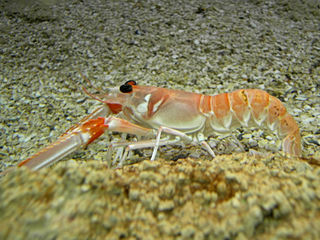
Nephrops is a genus of lobsters comprising a single extant species, Nephrops norvegicus, and several fossil species. It was erected by William Elford Leach in 1814, to accommodate N. norvegicus alone, which had previously been placed in genera such as Cancer, Astacus or Homarus. Nephrops means "kidney eye" and refers to the shape of the animal's compound eye.

Pinnotheres is a genus of crabs, including the pea crab. Many species formerly in Pinnotheres have been placed in new genera, such as Zaops ostreus, the oyster crab and Nepinnotheres novaezelandiae, the New Zealand pea crab. The species currently recognised in the genus Pinnotheres are:
Johannes Govertus de Man, was a Dutch biologist. He was assistant curator at the Rijksmuseum van Natuurlijke Historie in Leiden, where he specialised in free-living nematodes and decapod crustaceans, although he also wrote papers on flatworms, sipunculids and, in his dissertation only, vertebrates. His change away from vertebrates disappointed the director of the museum, and de Man left his job there after eleven years. For the rest of his life, de Man worked at his parents' house in Middelburg and later at a house near the shore at Yerseke in the Oosterschelde estuary, relying on his family's private income.

Mark C. "Marty" Rathbun is a former senior executive of the Church of Scientology who last held the post of Inspector General of the Religious Technology Center (RTC), the organization that is responsible for the protection and enforcement of all Dianetics and Scientology copyrights and trademarks.

Majidae is a family of crabs, comprising around 200 marine species inside 52 genera, with a carapace that is longer than it is broad, and which forms a point at the front. The legs can be very long in some species, leading to the name "spider crab". The exoskeleton is covered with bristles to which the crab attaches algae and other items to act as camouflage.

Palaemon is a genus of caridean shrimp of the family Palaemonidae. The conventional circumscription of the genus Palaemon is probably paraphyletic. Molecular data suggest that Palaemonetes, as well as the genera Exopalaemon and Couteriella, are nested within Palaemon. Phylogenetic affinities in these groups correspond better with geographical origin than conventional genus assignments.

Potamonautes is a genus of African freshwater crabs in the family Potamonautidae. It is both the most widespread and most diverse genus of African freshwater crabs, including more than half the species of this continent. They are found in most freshwater habitats of the African mainland and some species are semi-terrestrial.

Portunites is an extinct genus of decapod in the family Macropipidae. There are about 12 described species in Portunites.
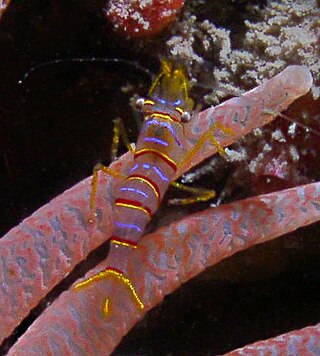
Lebbeus is a genus of shrimp in the family Thoridae. It includes a species whose name was auctioned in 2009 to raise funds for conservation; Luc Longley won with a bid of A$3,600. He named the shrimp Lebbeus clarehannah. The following species are included:

Inachidae is a family of crabs, containing 39 genera:

Metapenaeopsis, the velvet shrimps, is a prawn genus in the family Penaeidae. It contains these species:
Metapenaeopsis kishinouyei is a species of prawn in the genus Metapenaeopsis, the velvet shrimps. The specific epithet is a tribute to the Japanese fisheries biologist Kamakichi Kishinouye.
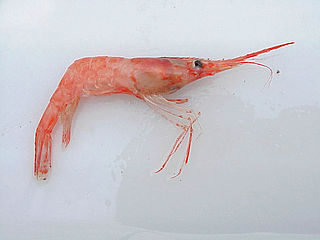
Pandalus is a genus of shrimp in the family Pandalidae. Members of the genus are medium-sized and live on or near the seabed. Some species are the subject of commercial fisheries and are caught by trawling. One species, Pandalus montagui, lives in association with the reef-building polychaete worm, Sabellaria spinulosa.

Pilumnus is a genus of crabs, containing the following species:
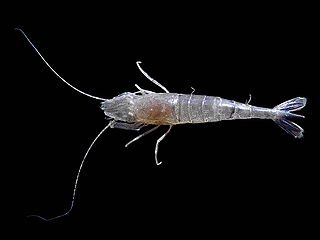
Crangon is a genus of shrimp.
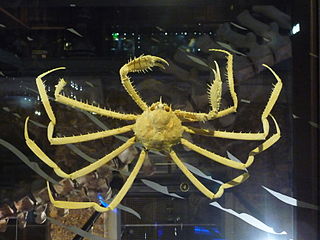
Platymaia is a genus of crab in the family Inachidae, containing the following species:

The Bay of Quinte Railway was a short-line railway in eastern Ontario, Canada. It was formed as the Napanee, Tamworth and Quebec Railway (NT&QR), chartered in 1878 by Edward Rathbun and Alexander Campbell, with plans to run from Napanee through Renfrew County and on to the Ottawa Valley. Lacking funding from the governments, development never began.

Heptacarpus is a genus of shrimps in the family Thoridae. There are more than 30 described species in Heptacarpus.

Leptuca is a genus of fiddler crabs belonging to the family Ocypodidae.

















